by Sandra Gulland | Dec 25, 2012 | Adventures of a Writing Life |
These are the 10 books I most enjoyed this year, in no particular order. An excellent year!
Fiction
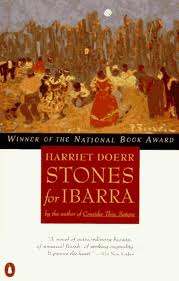
Stones for Ibarra by Harriet Doerr was a first novel published in 1978, yet it won the National Book Award. This doesn’t happen often for first novels. It is easy to see why it won, for it is a marvel, one of those novels that delights on every level: sentence by sentence, character by character. I especially enjoyed it because it is set in Ibarra, a small town in central Mexico, in a landscape not unlike the region we live in during the winter. It’s a novel I look forward to passing on to friends. Ten stars!
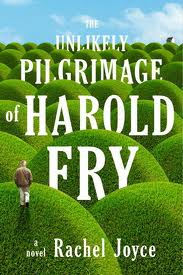
Unlikely Pilgrimage of Harold Fry by Rachel Joyce. I very much enjoyed this novel. Lovely sentences. Curiously, I read it on my iTouch, tiny screen by tiny screen, and that seemed right for this reflective novel.

Canada by Richard Ford. I love the hypnotic, sad texture of Ford’s prose. Here’s a lovely article on Ford and his work.
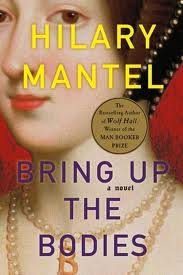
Bring Up the Bodies by Hilary Mantel. In a word: incredible.

The Emperor of Paris by C.S. Richardson. A jewel of a novel: I gave it a rave review in the Toronto Globe & Mail (here).

The Headmaster’s Wager by Vincent Lam. An epic story of a Chinese man, the headmaster of an English school in Vietnam during the Vietnam war. A fascinating and horrifying snapshot of the life of a civilian in those years of war and turmoil, a man who is himself an immigrant in a country occupied by Americans. A complex love story, a heart-rending family saga … all told in spare, perfect prose.

Web of Angels by Lilian Nattel. Set in Christie Pits area of Toronto—where the author lives—and about a woman who is “multiple” as a result of child abuse. It’s a brave novel about the child porn industry—which is huge—its victims and the DID (dissociative identity disorder) that results. A difficult and important book dealing with a horrific subject, but full of hope and love. Enlightening.

Between Shades of Gray by Ruta Sepetys. (No, this is not the Shades of Gray you’re thinking.) An amazing novel for both young and old adults, the shocking story of Lithuanians deported to Siberia under Stalin.
Non-fiction
I’ve been reading quite a few books on e-book publishing. I’ve noted the best ones here. Also, as always, books on writing, listed here.

Wild by Cheryl Strayed. I loved this! It made me want to hike, and I’m hardly even much of a walker.
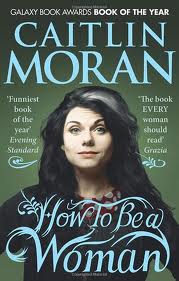
How to be a Woman by Caitlin Moran. Laugh-out-loud funny and wise. I want every woman I know to read this!
by Sandra Gulland | Sep 28, 2012 | Adventures of a Writing Life |

{Photo: Daughter Carrie and grand-daughter Kiki.}
Fall is upon us, which means, chez nous, that the suitcases have been hauled out and long To Do and Packing lists placed on the kitchen counter. We’ve begun to prepare for the annual migration south—but this year the voyage is complicated (enriched!) by a trip to Europe immediately after Thanksgiving, a raucous and fun-filled meal for twenty-four of our nearest and dearest.
Some time ago I thought it might be nice to go to the Kingston WritersFest immediately before Thanksgiving and departure. A crazy if lovely idea—it is, after all, a great festival—but somehow I managed to catch a nasty cold. (Me: who never gets sick!)
And so I’ve decided to leave Kingston in the morning and nurse my cold at home—alas! I did attend memorable workshops by Charlotte Gill and the amazing Helen Humphreys, among others. I also finally met historical novelist Eva Stachniak (author of The Winter Palace); we’ve corresponded by e-mail and through Facebook for a very long time. Writing is a solitary vocation, and it’s wonderful to meet other writers.
A Book Report
I finished reading Canada by Richard Ford (thumbs up!), and then plunged frenetically into one-two-and-then-three books on book promotion. They are:
Make a Killing on Kindle by Michael Alvear—which I read for obvious reasons. I learned quite a bit from it, and recommend it to anyone who is publishing on Kindle.
What to do Before Your Book Launch, by M.J. Rose and Randy Susan Meyers. Excellent! I’ve been through this book-launching process four times, and I’m amazed how much I’ve forgotten. The time-table alone (what happens when) is worth the price of admission. I recommend this book for all published and to-be-published authors.
And then, if these two weren’t enough, I dove into the book promotion-wizz M.J. Rose (above) referred to as “her bible”: Publicize Your Book! by Jacqueline Deval.
I’m exhausted at the thought of all I should be doing. No wonder I came down with a cold!

by Sandra Gulland | Jul 28, 2012 | Adventures of a Writing Life, Publication, The Shadow Queen, The Writing Process |
I’ve posted a few times of late about The Paradise Project, author Merilyn Simonds‘ limited-edition letterpress publication of short stories. In an age when publication is becoming more and more digital, I’m finding this hand-made centuries-old process fascinating.
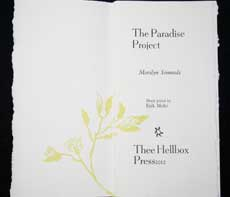
Merilyn has been blogging about the process. Her latest post, Gutenberg’s fingerprint, is especially evocative.
The studio is crowded today: all the people who worked onThe Paradise Project have gathered to see the final pages printed and put the press to bed. …
Mico looks at the press as he will one day look at the person he loves. “He let me run this thing when I was 14, and ever since, I’ve wanted to come back. It was a big mistake. Now I never want to leave.
Me neither.
On the news front, I’m awaiting the delivery of my edited last draft. I’m told that there are only about 50 small suggestions. (That’s nothing!) I’m also told I was described by an editor as “Queen of Revision.” I love that!
I’m considering changing my main character’s name from Claude (her historical name) to Claudine or Claudette. A number of readers get confused by what they consider a male name. I like the androgynous name and it suits Claude’s androgynous character, but I don’t like confusing readers (at least unintentionally). Your thoughts? Preferences? I’m leading toward Claudine.
I put off sending out my newsletter until later in August so that I could give more concrete information about the publication date, a possible title, the Josephine documentary as well as Sandra Gulland Ink publications.
Yes, there is a lot coming to a head next month!
Illustration at top is from Bibleodyssey.
by Sandra Gulland | Mar 1, 2011 | Adventures of a Writing Life |
(Note: I wrote this post on March 1st—but, not yet being used to WordPress, failed to publish it to the blog correctly. Lo siento!)
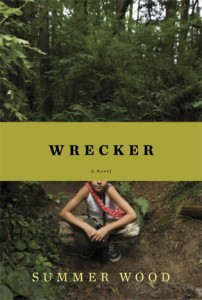
Yesterday I finished reading the novel Wrecker by Summer Wood.
First, you have to envy a woman with such a great name. Second, you can fairly easily predict that she has hippy roots.
I’m in the depths of writing now, and I find it difficult to find novels with a sufficiently enchanting voice to snare my restless spirit. This one did from the first page.
I’ve converted to reading books on my iPad, but I’m going to buy at least one print copy of this novel to pass around to friends. Yes: it’s that good. I want to shout about it ? once I come out from under its spell, which lingers.
The subject of the story is the rearing of a motherless boy?three years old at the opening of the novel and eighteen at the end?by what I would call an “intentional” (i.e. communal) community in the far reaches of northern California. It’s a dramatic, heart-rending and?yes, it’s fair to say?ultimately a happy story, although the word happy seems woefully inadequate to describe its fullness of heart.
The back-to-the-land setting is authentic, which I found refreshing. The author clearly loves each and every one of her characters. They are flawed; they are profoundly heroic. Wrecker, the boy at the core, is … well, he’s quite “a package.” As he matures, the word beautiful is often used to describe him. I don’t think I’ve ever read a novel that captures a male spirit—both its tenderness and strength—so well: in a boy, in a teen, in a man.
What I do not see mentioned in the reviews (so far)—and it’s something I found exceptional in this novel—is the voice, that elusive intelligence that informs literary fiction. As a writer, I’d call it jaw-dropping prose. Sorry, that’s not very elegant: but there it is. Pace, details, dialogue: all spare, all rich and perfectly enchanting.
It’s hard to single out examples, but I’ll slip in a few sentences from the first page:
Len stood waiting for his life to change.
Okay, you have to admit that’s a wonderful line.
He was a skinny man with a long face that showed its creases despite the stubble on his chin and cheeks …
I can picture this man?can’t you?
…and he kept moving his hands from the brim of his cap to the pockets of his jeans as thought he couldn’t be held responsible for what they might do if left unsupervised.
A great image, original and telling.
In an interview, Summer Wood said that it took her close to a decade “of intermittent work, and many many drafts, and reams of discarded pages to get this novel finished.” It shows in the craft.
Her mother charmingly weighs in here, and here’s the trailer.
If you read this novel—and I hope you do—let me know what you think.
(Afternote: Although I bought the e-book edition, I have just ordered it in hardcover as well so that I can share it with my friends.)
by Sandra Gulland | Aug 22, 2010 | Adventures of a Writing Life |
I love Sunday mornings with the Ottawa Citizen‘s wonderful book pages.

This morning I very much enjoyed an interview of David Mitchell, author of Cloud Atlas and, newly-out, The Thousand Autumns of Jacob de Zoet. Here are the passages I highlighted:
“Sometimes I try to write a scene, sometimes a sentence, and I can’t get to the end of it without half a morning’s research.”
I often fall into what I call “The Black Hole” of research when writing, and Mitchell’s statement makes me feel better about what I sometimes think is a diversion.
“Novelists … require a magpie mind.”
I love this.
I was thinking the other day about a South American author who said, “I’m a writer. Of course I steal.” (If anyone knows the name of this author, I’d love to give him credit.) I am incapable of making things up: I have to find each nugget, each tiny detail. Magpie mind indeed.
On the process of writing, Mitchell said: “It’s making something that isn’t working work. It’s like fixing an engine.”
And so, with that, I’ll head back into the machine shop … .
















